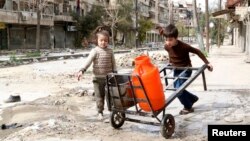GENEVA —
U.N. human rights investigators say the perpetrators of crimes during Syria's civil war will not escape justice. The U.N. Commission of Inquiry says it is amassing an ever-growing list of suspected war criminals on both sides of the conflict for future use in judicial trials.
In its latest update on the Syrian war, the U.N. investigators present evidence of atrocities and increasingly brutal methods of warfare. The report says the warring parties use civilians as hostages and human shields in the three year conflict that shows no sign of subsiding.
The report, submitted to the U.N. Human Rights Council, covers what it calls the “most egregious violations” of human rights committed by government and rebel forces between January 20 and March 10. It says civilians are repeatedly the victims of acts of terror by both sides.
The report accuses the al-Qaida linked Islamic State in Iraq and the Levant of using the Children’s Hospital building in the northern Syrian city of Aleppo as its headquarters and as a detention facility. It says the jihadist group conducted mass executions of detainees in the days and hours before coming under attack by other rebel groups.
The investigators condemn Syrian government forces for dropping "barrel bombs" on Aleppo and other cities. It says this weapon has spread terror among the civilian population and has caused many civilian casualties.
U.N. Commission of Inquiry Chairman Paulo Pinheiro warns those suspected of war crimes they will be held accountable one day. He says the commission has drawn up a list of individuals and entities, military units and security agencies as well as armed groups and their battalions, responsible for violations and crimes.
“The “perpetrators list” contains names of persons criminally responsible for hostage-taking, torture and executions. It also contains names of the heads of intelligence branches and detention facilities where detainees are tortured, names of military commanders who target civilians, airports from which barrel bomb attacks are planned and executed, and armed groups involved in attacking and displacing civilians.”
Syrian Ambassador Faysal Khabbaz Hamoui rejects the report. He accuses the investigators of relying on manipulative testimony and false media reports. He calls it biased and politicized.
“The recommendation made by the commission to refer the Syrian case to International Courts is an unnecessary and unlawful step as there are national judicial mechanisms available in Syria. The commission continues to ignore the role played by regional and international parties' support [for] Jihadists and Takfiri groups. First and foremost the United States of America, Qatar, Turkey, and Saudi Arabia," said Hamoui.
The Syrian ambassador says the Commission of Inquiry has failed in its function and should step down. He says the commission should recognize that Syria is fulfilling its role by fighting terrorism.
Pinheiro says this list is based on the testimony of more than 2,700 interviews as well as a wealth of documentary material. He reiterates his call for the U.N. Security Council to refer Syrian suspects to the International Criminal Court.
In its latest update on the Syrian war, the U.N. investigators present evidence of atrocities and increasingly brutal methods of warfare. The report says the warring parties use civilians as hostages and human shields in the three year conflict that shows no sign of subsiding.
The report, submitted to the U.N. Human Rights Council, covers what it calls the “most egregious violations” of human rights committed by government and rebel forces between January 20 and March 10. It says civilians are repeatedly the victims of acts of terror by both sides.
The report accuses the al-Qaida linked Islamic State in Iraq and the Levant of using the Children’s Hospital building in the northern Syrian city of Aleppo as its headquarters and as a detention facility. It says the jihadist group conducted mass executions of detainees in the days and hours before coming under attack by other rebel groups.
The investigators condemn Syrian government forces for dropping "barrel bombs" on Aleppo and other cities. It says this weapon has spread terror among the civilian population and has caused many civilian casualties.
U.N. Commission of Inquiry Chairman Paulo Pinheiro warns those suspected of war crimes they will be held accountable one day. He says the commission has drawn up a list of individuals and entities, military units and security agencies as well as armed groups and their battalions, responsible for violations and crimes.
“The “perpetrators list” contains names of persons criminally responsible for hostage-taking, torture and executions. It also contains names of the heads of intelligence branches and detention facilities where detainees are tortured, names of military commanders who target civilians, airports from which barrel bomb attacks are planned and executed, and armed groups involved in attacking and displacing civilians.”
Syrian Ambassador Faysal Khabbaz Hamoui rejects the report. He accuses the investigators of relying on manipulative testimony and false media reports. He calls it biased and politicized.
“The recommendation made by the commission to refer the Syrian case to International Courts is an unnecessary and unlawful step as there are national judicial mechanisms available in Syria. The commission continues to ignore the role played by regional and international parties' support [for] Jihadists and Takfiri groups. First and foremost the United States of America, Qatar, Turkey, and Saudi Arabia," said Hamoui.
The Syrian ambassador says the Commission of Inquiry has failed in its function and should step down. He says the commission should recognize that Syria is fulfilling its role by fighting terrorism.
Pinheiro says this list is based on the testimony of more than 2,700 interviews as well as a wealth of documentary material. He reiterates his call for the U.N. Security Council to refer Syrian suspects to the International Criminal Court.




